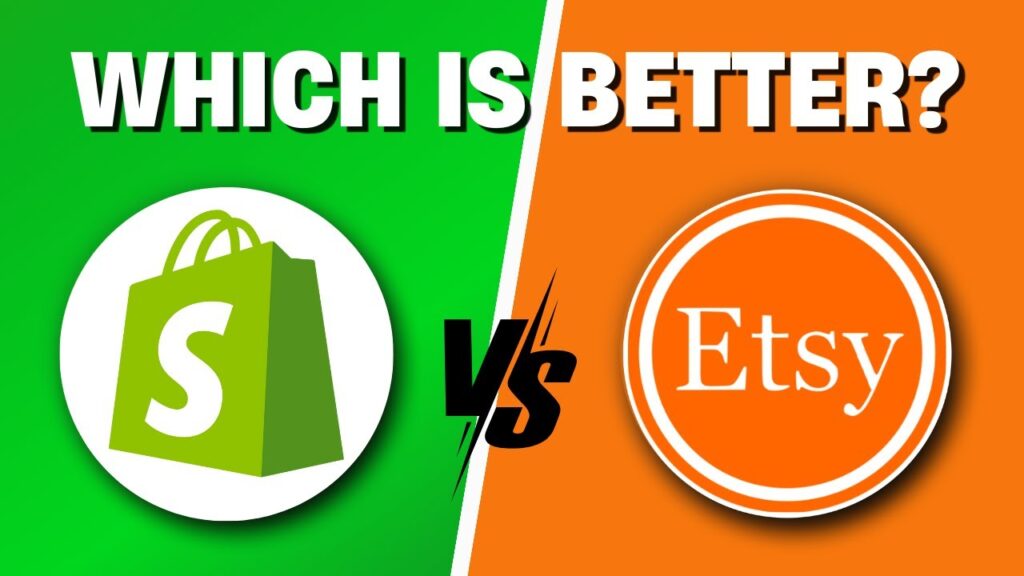Shopify vs. Etsy: Which Platform Sells Best?
Platform Overview
When it comes to online selling, Shopify and Etsy are two of the most talked-about platforms. Shopify is a dedicated e-commerce platform that allows users to build their own standalone online store, offering complete control over branding, design, and customer experience. This makes Shopify ideal for sellers looking to establish a long-term brand and build an independent business with fewer limitations.
On the other hand, Etsy is a marketplace focused on handmade, vintage, and unique goods. It serves as a community for buyers and sellers, providing an excellent entry point for beginners and creators who want visibility without the hassle of web development or extensive marketing strategies.
Ease of Use
In terms of ease of use, Etsy comes out on top. It is extremely beginner-friendly: users can create an account, upload their listings, and start selling with minimal effort. There’s no need for website design or hosting worries.
Conversely, Shopify requires a bit more initial setup. Users must select a theme, customize their store, and set up payment gateways like PayPal or bank accounts. However, Shopify offers an intuitive dashboard and a drag-and-drop editor, making the setup process manageable with plenty of resources available for guidance.
Fees and Pricing
Etsy operates on a pay-per-listing model, charging a 20-cent fee for each item listed and a transaction fee of 6.5% on sales, plus varying payment processing fees based on region. These costs can accumulate quickly, especially as your business scales.
Shopify charges a monthly fee starting at $19 if billed annually. The pay-monthly option begins at around $25, with pricing varying internationally. Shopify does not charge listing fees but does have transaction fees unless you utilize Shopify Payments. While Shopify’s monthly cost may seem higher, it becomes more cost-effective as sales grow, especially with larger inventories.
Customization and Branding
Shopify excels in customization and branding capabilities. Users have full control over their website’s design, branding, checkout process, and customer journey. This allows for a unique online store tailored specifically to a seller’s vision.
Etsy, however, operates within a more confined framework. While sellers can add logos and banners, the overall layout and functionality are largely similar across shops, limiting how much one can stand out from the competition.
Traffic and Audience
Etsy’s built-in traffic is one of its greatest advantages. With millions of monthly shoppers searching for handmade and creative products, Etsy can quickly provide visibility for new sellers.
Shopify, in contrast, requires sellers to actively drive traffic through SEO, social media marketing, paid ads, or email marketing. However, the benefit of Shopify is that once you build an audience, you own your customer data, enabling better retargeting, unlike Etsy where customer details are limited.
Scalability and Growth
In terms of scalability, Shopify is designed to grow with your business. Whether handling 10 or 10,000 orders a day, it can accommodate significant business growth through integrations with fulfillment centers and advanced marketing tools.
Etsy, on the other hand, is often better suited for side hustles or smaller operations. As businesses grow, many Etsy sellers find limitations in the platform and eventually migrate to Shopify for advanced growth opportunities.
App Integrations and Features
Shopify boasts a massive app store with over 8,000 applications for marketing, shipping, analytics, inventory, and customer support. This extensive range of integrations enables sellers to fully customize their store’s operations.
Etsy has more limited integrations and fewer automation tools, although third-party services can be used to connect with Etsy. Still, they lack the flexibility and built-in tools that Shopify provides.
Customer Trust and Shopping Experience
Etsy’s reputation as a trusted marketplace can enhance shopper confidence, potentially boosting conversions. However, products will always be displayed alongside competitors, which can lead to buyer distraction.
Shopify stores, when executed well, present a more professional appearance with a clean branded checkout process. This setup keeps customers focused solely on the seller’s products, minimizing competitive distractions.
Marketing Tools
Shopify provides full access to powerful marketing features, including abandoned cart emails, Facebook and Google ads integrations, SEO tools, and detailed analytics. Sellers have significant control over campaign targeting and the customer journey.
Etsy limits remarketing capabilities and does not provide full access to customer data. Etsy ads exist but are more automated and less customizable than Shopify’s advanced features.
Conclusion
So, which platform sells best? The answer largely depends on your business goals. If you are just starting out and want to test product ideas or sell handmade items with minimal upfront investment, Etsy is an excellent option. It provides immediate access to a built-in audience with low startup costs.
On the other hand, if you’re serious about building a brand and desire full control, scalability, and more robust marketing tools, Shopify is the better investment. Although it requires more effort at the outset, it allows for significant growth potential and business customization.
Many successful sellers initially start on Etsy and later transition to Shopify as their sales become consistent. Using both platforms can also maximize exposure and help build a loyal customer base.
Ultimately, your choice should align with your business strategy and aspirations. Are you team Etsy or team Shopify? Let us know in the comments!

 | Which Platform Sells Best for Online Entrepreneurs?
| Which Platform Sells Best for Online Entrepreneurs?
 | GA4 Setup for Wix Websites Made Easy
| GA4 Setup for Wix Websites Made Easy | Step-by-Step Guide for Freelancers & Online Sellers
| Step-by-Step Guide for Freelancers & Online Sellers